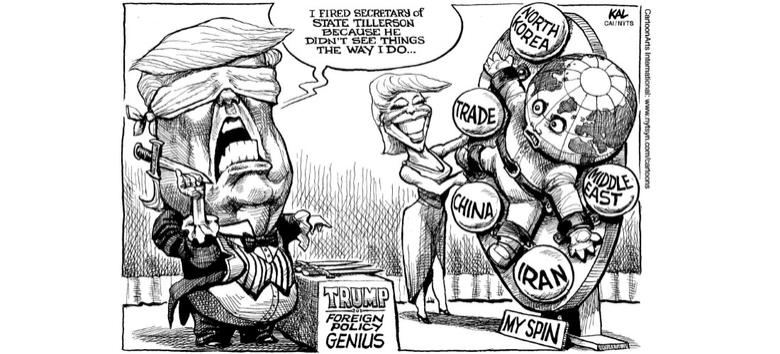
U.S. SANCTIONS AGAINST THE WORLD

CNBC - The U.S. trade war against China and sanctions regime is contributing to instability in the global oil market and putting pressure on prices, Russian Energy Minister Alexander Novak told CNBC on Wednesday.
"We can see that the pricing situation today depends not just on the supply/demand balance or the general economic situation but also on the uncertainty that we observe today in the global markets: the trade wars, the sanctions that the U.S. pursue," Novak said, speaking to CNBC's Geoff Cutmore at the Eastern Economic Forum (EEF) in Vladivostok, Russia.
Novak said geopolitical uncertainties such as the U.S.' decision to impose a massive package of tariffs on Chinese imports, as well as its sanctions on Russia and those coming up on Iran, could prompt oil prices to rise modestly.
"If we talk figures, I think that the additional premium is about $5-6 on top of the usual oil price, that would reflect the supply/demand balance," he said.
Benchmark Brent crude futures are currently trading at $79.21 while U.S. West Texas Intermediate (WTI) futures are at $69.82 per barrel.
Novak's comments come as oil market focus shifts away from a successful 2016 deal between OPEC and Russia (and other non-OPEC producers) to curb output in order to support prices, to current threats to the global oil supply.
Forthcoming U.S. sanctions on Iran's oil sector, coming into effect in November, are seen as the biggest disruptive force with oil market analysts predicting that Iran's daily production could fall by as much as 1.5 million barrels a day.
Novak's prediction that $5-$6 could be added to the price of a barrel of oil is conservative with many oil market watchers predicting prices per barrel could rise to $90 or even $100 per barrel, particularly when sanctions against Iran take hold.
Iran supply, China demand
Aside from Iran, the global oil supply could also be vulnerable to economic and political turmoil, and accompanying supply disruptions, in other major oil producing countries, namely Venezuela, Iraq, Nigeria and Libya.
There are also concerns that tariffs on Chinese imports will damage China's economy and could dampen its appetite for oil. Novak said there would always be consumers to fill the void, however.
"I think that the oil sector today is global. When we are talking about the supply/demand balance, we think globally," he said.
"If someone no longer buys it, somebody else takes over. And the same as regards consumption. Therefore, we do not take any special steps in order to forestall something in the future," he added.
With sanctions looming on Iran, Saudi Arabia, OPEC's de facto leader, and Russia have pledged to step in to the breach and pump more oil (much to the consternation of Iran, which has said no other OPEC can take over its share of oil exports) but how much spare capacity producers have, should supplies be affected beyond Iran, is uncertain.
Speaking on Tuesday at the EEF, Novak said that despite the Vienna accord helping the oil market to overcome a price slump crisis, the market is still "fragile" due to production declines in some countries, including Venezuela, Reuters reported. He added the market was still being influenced by geopolitical issues, such as uncertainty over Iran.
Oil prices rose on Wednesday as the upcoming sanctions against Iran raised expectations of tightening supply and following Novak's comments, as well as a report of declines in U.S. crude inventories.
-----
Earlier:

2018, September, 10, 13:00:00
FURTHER RUSSIA SANCTIONSBLOOMBERG - “Based on fundamentals, Russian sovereign risk is still extremely attractive for investors,” he said. “They’d be hard-pushed to find this kind of yield versus risk anywhere else.”
|

2018, September, 7, 12:45:00
U.S. PETROLEUM EXPORT RECORDU.S. EIA - The United States exported 7.3 million barrels per day (b/d) of crude oil and petroleum products in the first half of 2018, when exports of crude oil and hydrocarbon gas liquids (HGL) set record monthly highs. Crude oil surpassed HGLs to become the largest U.S. petroleum export, with 1.8 million b/d of exports in the first half of 2018. U.S. exports of crude oil, HGLs, and motor gasoline grew in the first half of 2018 compared with the same period in 2017, while distillate exports decreased 84,000 b/d |

2018, September, 7, 12:13:00
U.S. DEFICIT $50.1 BLNU.S. BEA - The U.S. Census Bureau and the U.S. Bureau of Economic Analysis announced today that the goods and services deficit was $50.1 billion in July, up $4.3 billion from $45.7 billion in June, revised.
|

2018, August, 27, 14:15:00
U.S. - IRAN SANCTIONSREUTERS - The lawsuit filed with the ICJ says the U.S. sanctions, which are damaging the already weak Iranian economy, violate terms of a little-known friendship treaty between the two countries.
|

2018, August, 22, 13:00:00
U.S. - CHINA: COUNTERPRODUCTIVEU.S. API - API emphasized the counterproductive effects of Section 301 tariffs on America’s natural gas and oil sector, underscoring the damaging impact that Chinese retaliatory tariffs would have on U.S. LNG exports, and urged the Administration not to impose additional tariffs on Chinese products at today’s hearing before the U.S. Trade Representative on Section 301. |

2018, August, 20, 14:20:00
U.S. OIL PRODUCTION 10.7 MBDU.S. API - The American Petroleum Institute’s latest monthly statistical report shows the U.S. set a record for the production of natural gas liquids (NGL) last month producing 4.4 million barrels per day (mb/d). July also saw the U.S. tie its record for crude oil production at 10.7 mb/d. |

2018, August, 13, 13:40:00
CHINA STOPPED U.S. LNGBLOOMBERG - Under the plan, PetroChina would boost buying of spot cargoes from other countries or swap U.S. shipments with other nations in East Asia to avoid paying additional tariffs, said the people, who asked not to be identified because the information isn’t public. |












